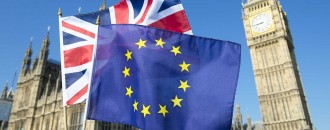
What next post-Brexit : Frexit, Nexit or Auxit?
Deepak Kumar
Brexit has certainly become an old cliché now. After the June 23 referendum, which ensured that Britain was no longer a part of the European Union, the focus has now shifted to when will Britain be able to complete all the necessary formalities and legalities; when will it be able to move out of the European Union; will it alienate itself from the 28-member grouping at all? The formal negotiation has not begun yet.
For the UK to exit EU, it must invoke “Article 50 of the Lisbon Treaty”: which gives both sides two years to strike formal terms of the split. Last month, British Prime Minister Theresa May said she intended to initiate this process by the end of March 2017. If this process does start in March next year, and if the two parties can successfully negotiate the two most important deals: trade and immigration, the UK would then leave the group by summer 2019. There are, however, several challenges in its successful execution: A significant percentage of British citizens wants to stay in the EU group, while others have said it may take about six years for the UK’s successful withdrawal, as the process will require approvals from the parliaments of 27 countries, which is indeed expected to take more than the envisaged two years.
So, while all the EU members including Britain contemplate the terms and conditions of the latter’s withdrawal, people in other EU member countries are also seeking to have their say in choosing whether they would like to stay in the European Union. In fact, Brexit has given birth to some similar but new terminologies: Frexit (For France), Nexit (The Netherlands), and Auxit or Oexit (Austria). Therefore, the prevalent question is who next or what next?
France (Frexit)
Following the worldwide economic downturn in 2008, that continued for almost five years in several parts of the world, France, like many other countries, has taken a gamut of initiatives to mitigate the impact and put the country back on a gradual growth path. Despite the adequate measurements, the country, which is also Europe’s driving force with Germany and the United Kingdom, currently faces a host of domestic issues including a sluggish economic growth, high level of unemployment, and continuous threats from terrorism. Brexit has further pushed uncertainty in the minds of the French, so much that almost 61% of the country’s population does not favour a union. The vivid resentment among the French is clearly visible in Marine Le Pen’s election campaign. The president of the National Front (FN), hailed Brexit memorandum as a phenomenon that cannot be stopped and indicated that France, too, could follow Britain’s path in leaving the Union. Incidentally, France is holding a presidential election next April, and Le Pen has said if she wins the election she will hold a referendum to decide the country’s membership of the grouping within six months. The current French President, François Hollande, however, is all for France remaining within the EU.
The Netherlands (Nexit)
Soon after the Brexit referendum, British politician and leader of the UK Independent Party Nigel Farage indicated that the Netherlands could be the next country to withdraw from the EU. There is, however, mixed sentiments among the Dutch voters, with just about 52% of them, in favour of holding a referendum. Like France, Netherlands is also planning to hold a general election on March 15 next year, and the Right-winger leader of the Party for Freedom, Geert Wilders, has pledged that he would pitch a UK-style referendum as one of the key talking points of his political campaign in March. The Nexit, however, does not quite sound obvious, as Dutch Prime Minister Mark Rutte has dismissed the idea of the similar-style exit polls, and instead has urged his political parties to work towards a smooth transition of Brexit.
Austria (Auxit or Oexit)
Last year, before Brexit happened, over 260,000 Austrians signed a petition urging their country to withdraw from the EU group. Turkey, one of Austria’s closest rivals, in on the brink of acquiring the EU membership. If Turkey does become a part of the EU, Austria’s Norbert Hofer, the candidate who missed out on winning the Austrian presidential election in November, said earlier this year that Turkey’s inclusion could further damage Austria’s interest in the EU. Like the opposition parties of the two aforementioned countries, Hofer underlined that his country should also hold similar kind of referendum within a year to decide on its EU membership, accusing the current president of diverting his focus from the country’s core strengths: economy and trade. The Austrian chancellor, Christian Kern, has, however, ruled out any such referendum.
Denmark
When the UK was getting ready to exit the EU, another EU member, Denmark was contemplating holding a similar kind of referendum. Once the EU referendum result was declared, there was a country-wide call in Denmark for a Dexit. The Danish People's Party (DPP), in particular, underscored that the country faced its biggest economic and strategic threats from the European Union and renewed their calls for a vote of Denmark’s membership of the EU in wake of the Brexit vote. DPP politician Marie Krarup had earlier underlined that there has been a growing Euroscepticism for a while and said that Denmark, too, shall hold a similar referendum to decide whether it plans to stay in the grouping or follow the Brexit path. In fact, Denmark is the first EU member country, where there was a collective call from most of the major national political parties. The Red-Green Alliance (RGA) also called for a Britain-style referendum in Denmark. Although Danish Prime Minister Lars Lokke Rasmussen and the country’s biggest opposition party the Social Democrats have also rejected Dexit phenomenon, a slimmer possibility can’t be ruled out considering Danish people has last year rejected adopting EU rules on cross-border policing. Besides, Denmark had decided to opt out of EU policies as part of Edinburgh Agreement in 1992.
Prior to the Brexit referendum, various European countries had considered their liabilities and interests to exit from the EU. Italy and Scotland, in particulars, have not quite believed in their solidarities with the EU. Europe’s open door immigration/freedom of movement policy is pushing Netherlands, Austria and Hungary away from the grouping. Terrorist attacks in France and Germany continue to further complicate their existing problems. Given the EU members’ internal domestic problems, their dissatisfactions with how the EU operates, their certain political contingents supporting withdrawal from the grouping, and above all, their democratic choice to exit the EU, it is interesting to wait, watch and see, who will follow Britain and become another anti-EU member?





